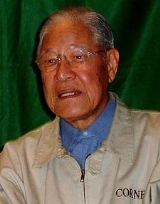
Lee Teng-hui
Lee Teng-hui (born 1923-01-15) is a politician in the Republic of China (ROC). He was the President of the Republic of China and Chairman of the Kuomintang (KMT) from 1988 to 2000. His tenure was marked with major extensions to the democratic reforms initiated by Chiang Ching-kuo. He also promoted the Taiwan localization movement and led an aggressive foreign policy to gain diplomatic allies. His critics accused him of black gold politics and being a secret supporter of Taiwan independence who was trying to undermine the party he headed. After leaving office, Lee has confirmed some of these accusations by emerging as a radical Taiwan independence activist, and currently serves as the "spiritual leader" of the pro-independence Taiwan Solidarity Union.
Sourced
- I am more than seventy years old. Having lived under different regimes, from Japanese colonialism to Taiwan’s recovery, I have greatly experienced the miseries of the Taiwanese people. In the period of Japanese colonialism, a Taiwanese would be punished by being forced to kneel out in the sun for speaking Tai-yü. The situation was the same when Taiwan was recovered: my son, Hsien-wen, and my daughter-in-law, Yüeh-yün, often wore a dunce board around their necks in the school as punishment for speaking Tai-yü... [Taiwanese peoples’] lives are influenced by history. I think the most miserable people are Taiwanese, who have always tried in vain to get their heads above the water. This was the Taiwanese situation during the period of colonialism; it was not any different after Taiwan’s recovery [that is, the rule of the Chiang-era KMT]. I have deep feelings about this.
- Chung-yang jih-pao (Central Daily News), International Edition, 1994-04-16), as quoted in Hsiau, A-chin, "Language Ideology in Taiwan: The KMT’s language policy, the Tai-yü language movement, and ethnic politics," Journal of Multilingual and Multicultural Development (1997), 18.4, p. 302
